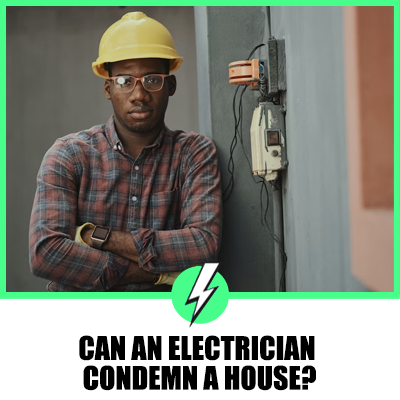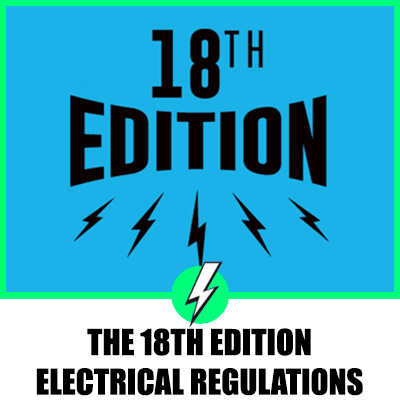Can An Electrician Condemn A House?
When it comes to the safety and livability of a home, one of the key factors to consider is the state of its electrical system.
A faulty or outdated electrical system can pose serious risks, including electrical shocks and fires.
But can an electrician condemn a house due to these issues?
Let’s explore this topic in detail.

Contents
What Happens During an Electrical Inspection?
An electrical inspection involves a thorough examination of the entire electrical system of a house.
This includes checking the wiring, outlets, switches, and circuit breakers.
The goal is to identify any potential hazards, such as overloaded circuits, faulty wiring, or improper grounding.
In the UK, the Electrical Safety Standards in the Private Rented Sector (England) Regulations 2020 require landlords to have the electrical installations in their properties inspected and tested at least every five years by a qualified person.
The electrical installation must be safe, and the landlord must provide the tenants with proof of this.
In the US, the frequency of electrical inspections can vary depending on the state and local regulations.
However, it’s generally recommended to have an electrical inspection when buying a new home, after a major renovation, or if the house is more than 40 years old.
Can You Sell a House with Unsafe Electrics?
Selling a house with unsafe electrics can be a legal and ethical issue.
In the UK, landlords are legally required to ensure that the electrical installations in their rented properties are safe and in working order.
If a property fails to meet these standards, it could lead to legal repercussions.
In the US, while there are no federal laws requiring a seller to fix electrical issues before selling a house, many states have disclosure laws.
These laws require sellers to inform potential buyers about known issues with the property, including electrical problems.
How Does an Electrician Check for Faulty Wiring?
An electrician checks for faulty wiring by conducting a comprehensive inspection of the electrical system.
This includes visually inspecting the wiring and using specialized tools to test the electrical circuits.
They look for signs of wear and tear, outdated wiring, improper wiring, and other potential hazards.
In the UK, the inspection will result in an Electrical Installation Condition Report (EICR), which details the condition of the electrical installations and any remedial works or further investigations which may be needed.
If the report contains a code C1, C2, or FI, then the landlord must ensure that further investigative or remedial work is carried out by a qualified person within 28 days, or less if specified in the report.
What Electrical Work is Not Notifiable?
In the UK, not all electrical work is notifiable under Part P of the Building Regulations, which governs the safety of electrical installations in homes.
Non-notifiable work includes minor electrical work such as replacing switches, sockets, or light fittings, and repairs, replacements, and maintenance work.
However, any new circuits, or alterations or additions to existing circuits in ‘special locations’ like bathrooms, swimming pools, or saunas, are notifiable and must be reported to the local building control body.
In the US, the requirements can vary by state and local jurisdiction, but generally, minor repairs and replacements do not require a permit.
However, major electrical work, such as adding new circuits or significantly altering existing ones, typically requires a permit and inspection.
Can An Electrician Condemn A House?
While an electrician can identify serious electrical issues that pose a risk to the safety and livability of a house, they do not have the authority to condemn a house.
The power to condemn a house typically lies with local government agencies, such as the local building or housing authority.
In the UK, if a landlord does not carry out the necessary works identified in the EICR, the local council has strong legal powers.
They can require the landlord to do safety works or even do the works themselves if necessary.
Local authorities also have the power to fine landlords up to £30,000 if they do not comply with their legal obligations under the Regulations.
In the US, if a house is deemed unsafe due to serious electrical issues, the local building or housing authority can issue a condemnation order, which may require the occupants to vacate the house until the issues are fixed.
In conclusion, while an electrician can’t condemn a house, they play a crucial role in identifying electrical issues that could potentially make a house unsafe to live in.
Therefore, regular electrical inspections are essential to ensure the safety and livability of a house.
Legal Obligation to Condemn/Lock-off Unsafe Works
The topic of an electrician’s legal obligation to condemn or lock-off unsafe works is a complex one.
According to a discussion on the Electricians Forums, electricians do not have the legal power to condemn or isolate unsafe works, unlike GasSafe registered individuals.
However, they do have a moral and professional obligation to make dangerous works safe.
The usual procedure when a dangerous situation is identified is to rectify or isolate it with the client’s consent.
If the client does not consent, a written notice such as an Electrical Danger Notice should be issued, and any work being carried out should cease.
Beyond that, electricians do not have the power to cut off anyone’s electrical supply.
However, if an electrician isolates, cuts off, or interferes with an electrical installation without the owner’s permission, they could be guilty of an offense and could be liable for any injury, damage, or loss caused as a result.
Therefore, it’s crucial for electricians to communicate effectively with their clients about any potential hazards and the necessary steps to rectify them.
Can Getting an Estimate from an Electrician Lead to the House Being Condemned?
A Reddit user asked whether getting an estimate from an electrician could lead to their house being condemned if severe problems were found.
The consensus in the responses was that electricians are not under any obligation to report issues to local municipalities, and it would be very unlikely for a house to be condemned based on an electrician’s findings.
However, if the house’s electrical system is found to be in a truly dangerous state, the electrician might refuse to do only a partial job.
Also, if the homeowner’s insurance company finds out about the unsafe conditions, they could potentially drop the homeowner’s coverage or give them a timeline to bring everything up to code.
In conclusion, while electricians have a responsibility to ensure the safety of electrical installations, they do not have the power to condemn properties or force homeowners to undertake extensive repairs.
Homeowners, on the other hand, should take any safety concerns seriously and take appropriate action to rectify any issues.





